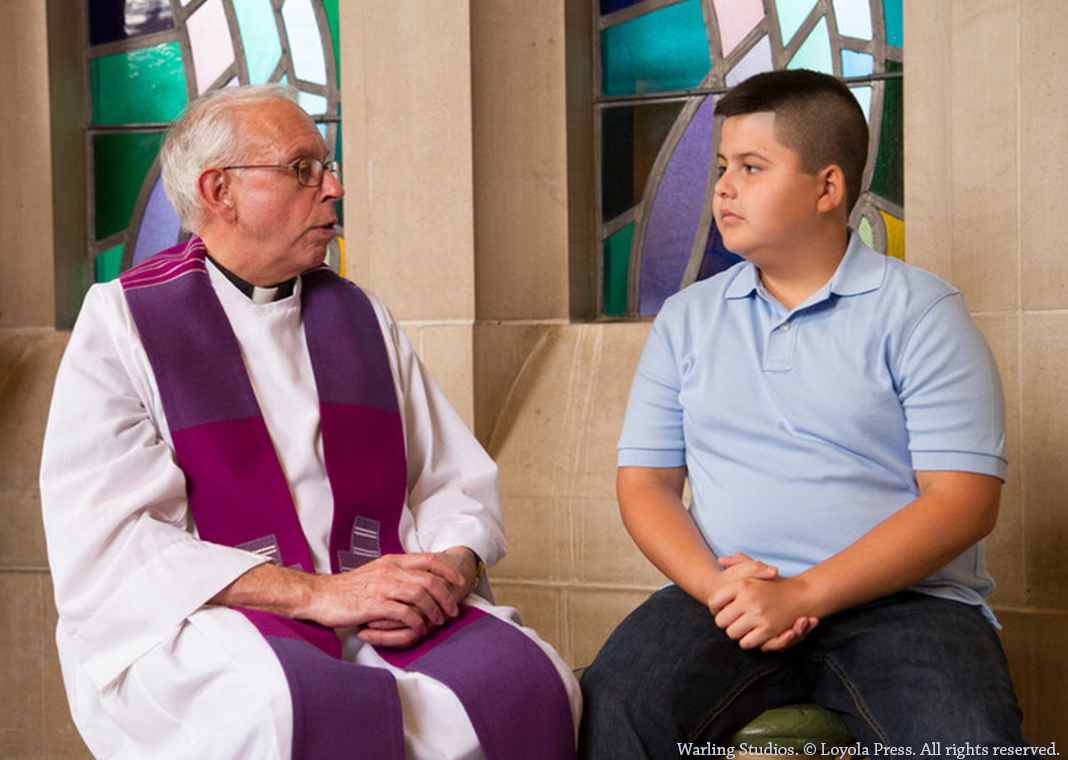
In a recent class, I asked who had made their First Reconciliation. All my third-grade students raised their hands. But when I asked how many have celebrated Reconciliation since then, the majority of their hands went down. Even though these children are only one year removed from preparing for their First Reconciliation, they still need to learn about Reconciliation and God’s forgiveness. How do we turn a first-time experience into a life-long practice?
I decided to ask the class to share their experiences of the sacrament. It is incredible how much the children really understand the basics of Reconciliation. Talking with them is a great way to see where there might be confusion or misunderstanding. After our initial talk, we did a quick review of why we celebrate Reconciliation and how to do it.
I used an examination of conscience for third graders that my catechetical leader gave me to help the children understand what sin is. As expected, when we got to “You shall not kill,” they looked around with a smile thinking they were safe from having broken that commandment. There were quite a few surprises when I read off questions about being hurtful to other people both in words and actions. Asking them if they haven’t been nice to a brother or sister got a strong reaction.
Then a hand went up in the air. One of the boys asked, “I see it asks if you’ve harmed another person or animal, but what about if you’ve been hunting? That’s harmful to the animal.” What a great and surprising question! I explained that he should ask himself if he hunted the animal in a humane way, used the meat, and disposed of the carcass properly—it would be a sin to kill animals just for fun or to torture them.
Another hand shot up in the air. One of the girls volunteered to tell us about her sins. I used this time to remind the students that their sins and their confession are between them, God, and the priest. They don’t need to discuss their sins with anyone, except maybe with their parents or trusted adults as needed.
I ended the class by asking them to think about their relationship with God with regards to their sins. I had them lay on the floor as quietly as possible—getting a dozen third graders to lay down quietly for any amount of time can be difficult, especially at four in the afternoon. Then I read the Act of Contrition in a quiet, calm voice. On the second time through the prayer, I paused to explain each line to them. This was the moment when they really seemed to understand our need for God’s forgiveness.
We finished our class talking about our personal experiences with Reconciliation, sharing our previous penances and how we felt after absolution. I was reminded how my own daughter explained her feelings about her First Reconciliation.
We spend so much time educating and preparing our young Catholics for their First Reconciliation, but we need to continuing to educate them on the importance of the regular exercise of this healing sacrament. After all, conversion is a life-long process.





Thanks to Lisa. I am sending this on to my catechists who will be reviewing this sacrament for reception between now and Easter.
Thanks for this great suggestion, Lisa. I’m grateful that, at the last 2 parishes where I served as a catechist, the children were brought to church twice a year to receive the Sacrament of Reconciliation: Advent and Lent. Aside from the Eucharist, it’s the one sacrament that we can receive as often as we want so why not teach kids to do just that?
We require our students, grades 2 – 11, to attend a Reconciliation Prayer Service (Communal Penance Service) annually. We have a special service for First Time students in December after preparation. However, it is required they sign in at a service annually after that. We typically have four to six priests present to hear confessions at the end of a short service. Some parents initially voiced disapproval for this but once it was explained that we are not forcing the sacrament on anyone (it is up to the individual to opt to actually receive the sacrament at the end of the service) but requiring them to look inward at their own thoughts, feelings and actions each year. And, oh by the way, come and JOIN your children in this activity! As this has now become the norm in our parish, we are excited to see not only the children talking with the priests at the end of the service but also so many adults also receiving the sacrament. It is an incredible experience and one that I truly am honored to witness unfolding. Reconciliation gives us such a boost – a shot in the arm in an incredible way. I believe people here are reconnecting with that and what a great thing to unfold. Now, we will also accept a call in from a parent saying his or her child received the sacrament before Saturday Mass or at another time individually/privately with the priest but that is their decision to make. Personally, I think we all need to assess our lives and our actions and it is of great benefit for all present to read through the Examination of Conscience and really think about our choices each day. 🙂
May God bless you for your many efforts in sharing the faith and helping your third graders appreciate the wonderful gift of the sacrament of reconciliation. I enjoyed your comments and suggestions and will share them w/my catechists.I will also adjust some of your suggestions for use w/my confirmandi. We host a retreat w/the students and sponsors each year and I believe some of your ideas/suggestions would be worth exploring w/this class.Thank you!
What an informative article. Abstract ideas are difficult for young students to grasp and what a great lesson this was for all! Excellent!’
Dear Joe,
Just a thank you! As a 4th grade catechism, with Moses & the 10 Commandments being the syllabus, tomorrow’s class was going to be the 6th Commandment. Teaching how you can kill a spirit, enthusiasm, confidence, etc. We Lent drawing near, I wanted to tie in Reconciliation & you have helped me to be able to work that into my lesson plan!!
Thank You so Much!!
Re: (amending my above comment)
Thanks Joe for sharing Lisa’s Jones’ article on Reconciliation!
Thank you for your comments on the post. I don’t want them to think of it as an obligation, but as a beautiful experience of God’s love that they will turn to in life as they grow up and face uncertainty or difficulties. It is my hope that the kids really see the sacrament for what it is – a healing sacrament.